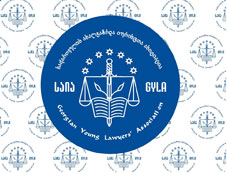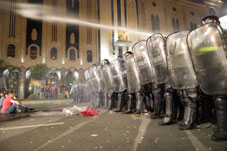
GYLA demands victims of June 20-21 to officially receive victim status
By Khatia Bzhalava
Tuesday, May 26
On May 25th, Georgian Young Lawyers Association(GYLA) released a statement on the June 20-21 events, where they note that 23 individuals injured as a result of the raid, were once again rejected to receive victim status by the prosecution. GYLA reports the verdict to the court and demands the victims to be assigned with relevant legal status.
According to GYLA, unless the victims officially receive the status, they will not be able to effectively participate in legal proceedings, nor will they be introduced to the case materials, which hinders them from observing the effectiveness of the prosecution.
The General Prosecutor's office of Georgia, investigates a case of criminal justice in terms of exceeding working powers by using weapons and violence on the activists of June 20-21. In the frame of the mentioned case, GYLA once has already referred to prosecution to give the persons under GYLA’s defence an official status of victims, but neither prosecution, nor the court satisfied the appeal. The reason for rejection was explained to have been an absence of examination results(by the time of appeal), which was supposed to examine the injuries of the affected people. Later, only Mako Gomuri and Giorgi Sulashvili received the status, but regardless, the victims and the GYLA were not fully introduced to the details of the case.
As GYLA states, even after a year after launching the investigation, the prosecution still names absence of examination results as a reason for leaving 23 people without the status and explains that “the fact of even doubtless damage to health, cannot be considered as the only basis of considering somebody affected since the offensive nature of the damage should be confirmed as well.”
GYLA believes that repeated rejection of their demand will be an illegal and unreasonable manner of prosecution. According to the organisation,the current legislation clearly determines the legal basis of giving away victim status, according to which, a person is considered as affected, if he/she had been harmed mentally, physically or materially as a result of criminal act and as GYLA states, considering this prosecution is liable to recognise a person as a victim, when the damage(injury) is determined to have been caused by the criminal act, regardless of whether the offender has been identified or not.
According to the statement, it is explicitly established that the damage to the part of affected people had been caused by illegal use of rubber bullets, which were also used on journalists, who were on the site to report the events.
As the statement notes, the dynamics of the June 20-21 case also prove the existence of shortcomings in the investigation. Apart from the fact that the victims are not properly contributed to the legal proceedings, the inability of the prosecution to finally confirm the sources of injuries and obtain the report of expertise also doubts the objectiveness and comprehensiveness of the inquiry.
The statement reads, unless the manner of investigation is amended and the appeal is satisfied, GYLA will refer to the European Court of Human Rights.
On June 20-21, 2019, which is also known as Gavrilov’s night, Georgian Law enforcement dispersed the crowd gathered in front of Parliament of Georgia, in response to the appearance of member of the Russian Duma, Sergei Gavrilov on the chair reserved for the head of parliament. Local and international NGOs believe that non-proportional police force was used against civil protest as they used tear gas and rubber bullets to disperse the protestants. Approximately 240 demonstrators were injured during the clashes with police and 305 protesters were arrested. Two people experienced eye injuries and lost eye vision due to rubber bullets.


